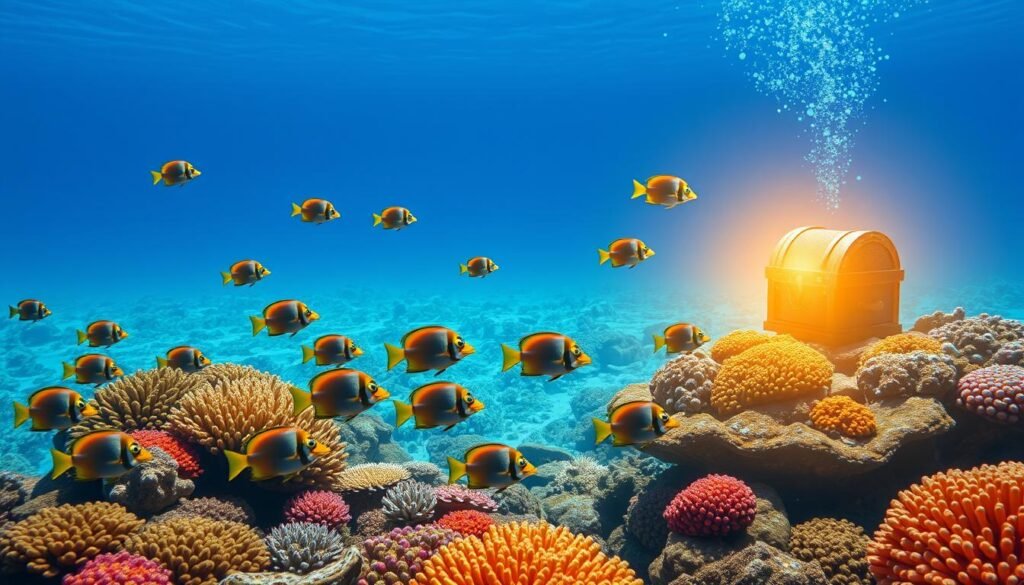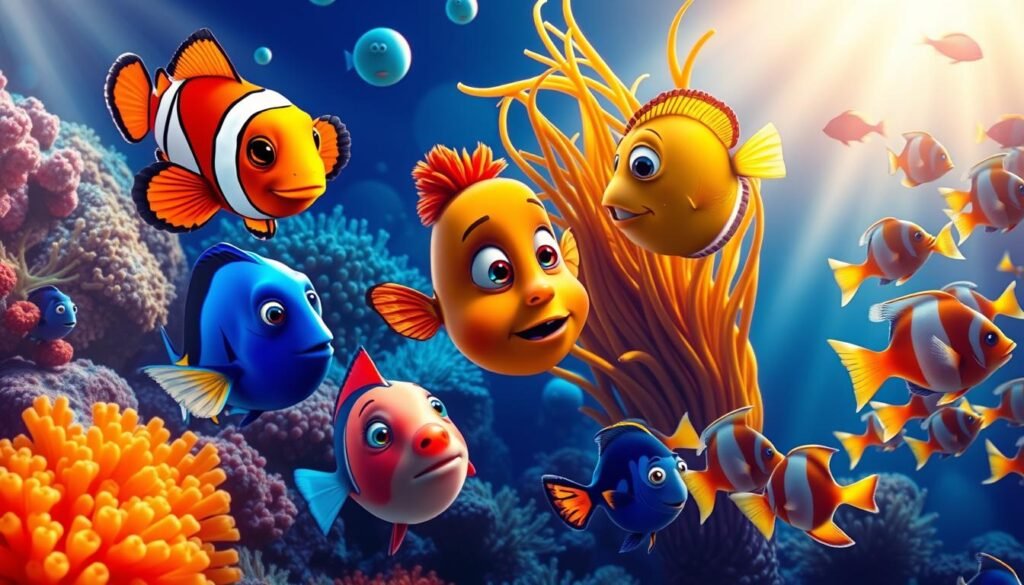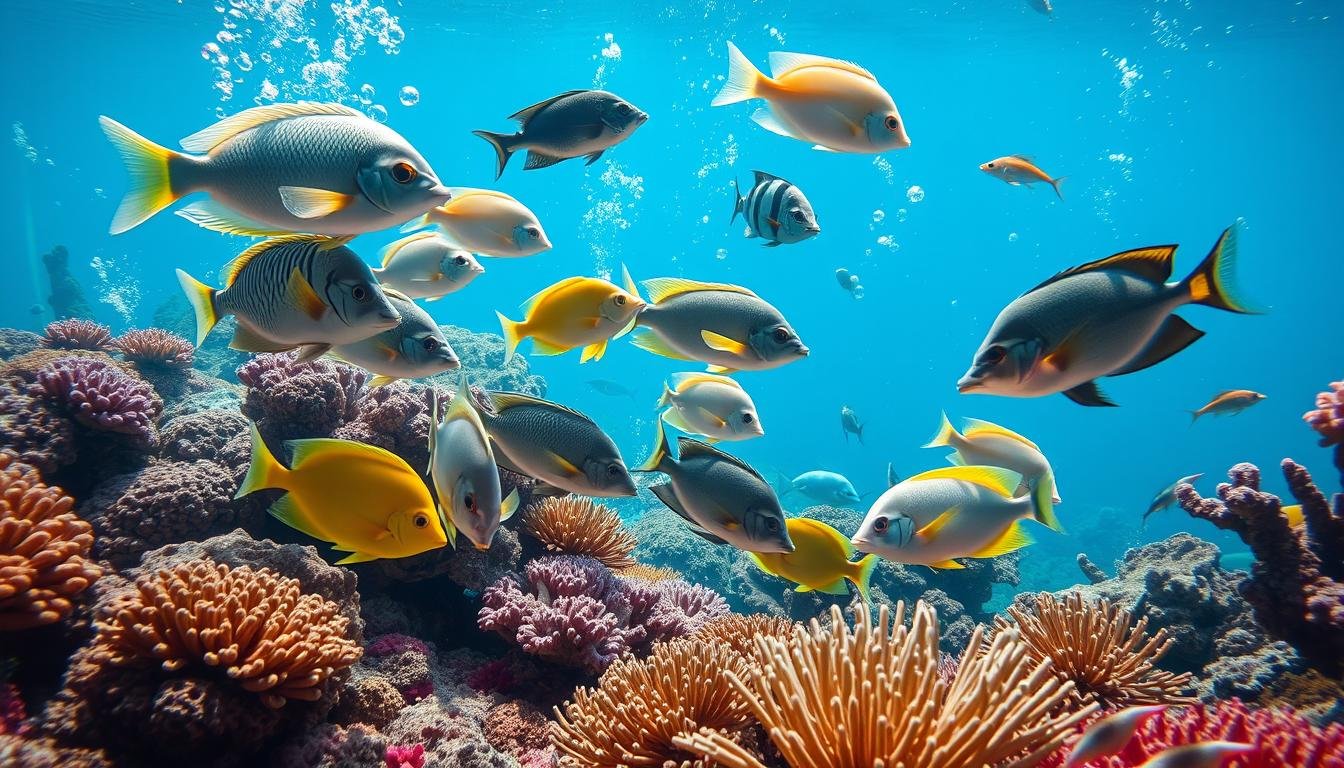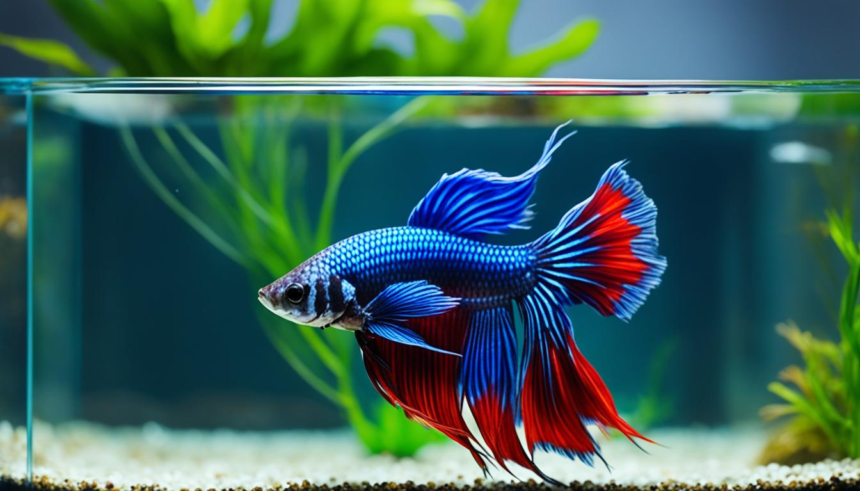Many people think fish are simple-minded. But recent studies show they are much smarter. Australian biologist Culum Brown’s work has revealed fish have advanced thinking skills. They can remember things for a long time and even recognize each other.
Fish can recall escape routes in just five tries and remember them for a year. This shows they have a long-term memory. When fish learn together, they pick up new skills faster, especially in groups of five.
Fish can also learn by watching others. They can spot prey and where to find food in just five tries. This shows they can share knowledge and learn from each other, like some species learn migration routes.
Challenging the Myth of the Three-Second Memory
Many people think fish only remember things for three seconds. But, research shows this is not true. Fish have much more complex thinking abilities than we thought.
Studies have found that fish memory and spatial recognition are much better than we believed. They can remember and understand things for a long time.
Studies on Fish Memory and Spatial Recognition
Goldfish, for example, can remember complex things for months, not just seconds. In one study, goldfish learned to find their way out of a tank. They remembered this route for a whole year.
This shows that fish learning and memory can last a long time. It’s much longer than the “three-second memory” myth.
Research also shows that fish cognitive abilities include spatial awareness. Fish can remember where things are in their environment. They can even remember where to find food or escape routes.
A 2022 study found that goldfish can figure out distances by swimming through a tank. They use visual cues to navigate. This shows they can understand their surroundings in a complex way.
| Findings | Implications |
|---|---|
| Goldfish memory can span several months | Challenges the myth of a three-second memory in fish |
| Goldfish can distinguish objects and demonstrate spatial awareness | Indicates advanced cognitive abilities beyond basic perception |
| Fish can learn and remember escape routes and resource locations | Suggests fish possess complex spatial mapping and memory capabilities |
These studies show that fish memory and cognitive abilities are much more advanced than we thought. They prove that fish can remember and understand things for a long time, not just for three seconds.
Social Learning and Cultural Transmission in Fish
Fish are smart in learning from each other. They can pick up new skills and behaviors by watching their friends. They learn how to find food, follow migration paths, and even pass these skills down to their young.
At Stanford University, scientists studied cichlid fish. They found these fish can make smart choices, just like four-year-old kids. This shows fish are more intelligent and social than we thought.
Male threespot gouramis form complex social groups. They even have a pecking order outside of mating season. A study at Mount Holyoke College showed that these fish can also learn to avoid fights by recognizing signals for food.
Researchers at the University of Göteborg discovered something cool. They found that fish can judge who’s stronger based on what they’ve seen before. This means they can act differently when facing someone they know or don’t know.
Learning from others and creating traditions shows advanced social smarts. Studies on fish social learning, fish cultural transmission, fish social intelligence, and fish behavior are changing how we see fish. They’re proving to be more than just simple creatures.
Recognizing Individual Identities and Social Hierarchies
Fish are smarter than we thought. They can tell each other apart and remember their place in a group. This shows they have a complex social life.
They prefer to hang out with fish they know. They even remember who won fights in the past. This shows they have a good memory for social stuff.
Fish Demonstrate Complex Social Intelligence
Scientists are now studying fish more closely. They’ve found that fish are more than just simple animals. They have complex social behaviors.
- Fish can recognize individual members of their own species and remember their relative social status.
- They can observe and learn from the social interactions of others, using this information to navigate their own social hierarchies.
- Some fish species have been shown to engage in cooperative behaviors, such as hunting or defending their territory, demonstrating a level of social coordination that was previously thought to be exclusive to more complex vertebrates.
This research shows fish are as smart as other animals. They have been underestimated for too long. We need to understand their complex nature better.
Neurological Evidence for Fish Cognitive Abilities
Recent studies have shown that fish are smarter than we thought. They have brain structures similar to those of other animals. This means they are more intelligent than we believed.
Research found that social fish have bigger brain parts for social info. This is like other animals. They also learn, solve problems, and remember faces. These are signs of smart thinking.
This new evidence changes how we see fish. They are not simple creatures. They have complex brains and can think deeply. This knowledge affects how we manage fish and treat them.
Exploring fish brains shows they are complex and smart. They can learn, remember, and solve problems. This changes how we see and treat them.
fish intelligence Demonstrated Through Tool Use
For a long time, people thought fish were not very smart. But new studies show they are actually quite intelligent. They use tools to hunt and solve problems.
Innovative Hunting and Problem-Solving Strategies
Archerfish are amazing at knocking down insects with water. They can spit water up to 10 feet away with almost perfect accuracy. This skill requires them to make complex calculations.
Tuskfish also show off their smarts by using rocks to open shells. This was thought to be a skill only the smartest animals had. Their clever hunting ways show fish are more intelligent than we thought.
Fish also use tools for other challenges. For example, Atlantic cod in tanks can turn on a self-feeder. They do this by pulling a string with a loop, showing they can learn and solve problems.
More and more evidence shows fish are smarter than we thought. They use tools and solve problems in complex ways. This new understanding of fish intelligence is changing how we see them.
Delayed Gratification and Planning Abilities

Recent studies have shown that some fish, like cuttlefish, are smarter than we thought. They can delay gratification and plan for the future. These skills were once thought to be only for animals with bigger brains.
In a 2020 study, cuttlefish showed they could plan ahead. They didn’t eat their morning snack to get a better treat for dinner. They could wait up to 50–130 seconds for better rewards, just like some big-brained animals.
The study found that cuttlefish could learn from visual cues. They knew different symbols meant different snacks. They could resist the immediate reward, like humans and some animals with self-control. The study also linked better self-control to smarter learning in cuttlefish.
| Animal | Delay Gratification (seconds) |
|---|---|
| Rats, Chickens, Pigeons | Several seconds |
| Chimpanzees, Crows, Parrots | Several minutes |
| Cuttlefish | 50-130 seconds |
This study shows that cuttlefish have amazing fish cognitive skills and fish planning abilities. They are as smart as some big-brained animals. It challenges the idea that fish intelligence is low. It also highlights the fish delayed gratification abilities of these incredible sea creatures.
Escape Artists: Octopuses and Their Creative Escapes
Octopuses are known as the smartest invertebrates in the world. They amaze scientists with their clever escapes and problem-solving skills. These cephalopods show that aquatic life can be just as smart as animals on land.
Octopuses are as smart as a golden retriever, with each tentacle having its own brain. Their brains spread out in their limbs, making them very flexible and clever.
Octopuses are experts at getting out of tight spots. They can turn off lights, squirt water, and even squeeze through small openings. One octopus named Inky even escaped from a New Zealand aquarium by using a pipe to get back to the sea.
They can solve problems like opening jars and stealing video cameras. Octopuses also use tools like coconuts and shells. They even pretend to be other sea creatures to scare off predators.
Octopuses are not just smart; they can also remember human faces. They feel emotions like joy, pain, and excitement. This shows how complex their intelligence is.
As we learn more about octopus intelligence, octopus problem-solving, and octopus behavior, we see how amazing they are. Their ability to adapt and solve problems shows the incredible diversity of intelligence in the sea.
Impressive Memory and Navigation Skills
Fish are smarter than you might think. They have great memory and can navigate their surroundings well. They can remember where food is, how to escape, and even who their friends are.
For example, common shore crabs can solve complex mazes and remember them for weeks. Goldfish can remember things for at least a month. Some research suggests they might remember for up to six months.
A study has been going on for three years to learn how long goldfish remember things. It uses 40 goldfish of different breeds. The maze they use has many paths, showing how fish learn and remember.
The study shows how fish have evolved to be smart. It uses food rewards to see how fish learn and remember. This makes the study more natural and accurate.
Fish are not just smart in memory and navigation. They also show self-awareness, social skills, and can use tools to hunt. These findings change how we see fish, showing they are more complex and intelligent than we thought.
Emotions and Pain Perception in Aquatic Life

Research shows that fish and other sea creatures can feel emotions and pain. This challenges the old idea that they don’t have feelings. Studies have found that fish act like mammals with emotional fever when stressed. They also show signs of feeling pain when hurt.
This new understanding of fish and sea life’s feelings is important. Every year, trillions of fish are caught, farmed, and traded. This shows how big the fishing and farming industries are. But, knowing fish can feel pain makes us rethink how we treat them.
In 2022, researchers looked into fish feelings. They found that fish can feel fear, joy, and other emotions. This shows that fish have complex feelings like other living beings.
Studies have found that many fish have special nerves for pain. When hurt, they act differently, like eating less. This shows we should think about fish pain when we care for them.
Knowing more about fish feelings can help change how we treat them. We need to share this science with the public. This way, we can make the fishing and farming industries better for all animals, including those in the sea.
Conclusion
The study of fish intelligence and aquatic life intelligence has changed our views. It shows that fish and other sea creatures are smarter than we thought. They can remember things for a long time, learn from each other, use tools, and even plan ahead.
This new knowledge about intelligence and sentience in sea life has big ethical implications. It’s especially important for the fishing industry, which often ignores the well-being of these animals. As we learn more about their minds, we must rethink how we treat them.
We should treat fish and other sea animals with the same respect as other living beings. Recognizing their intelligence and feelings helps us act more ethically. This way, we can protect these amazing creatures and keep their homes safe from harm.
FAQ
What research has challenged the perception that fish are less intelligent than land animals?
Australian biologist Culum Brown’s research has shown that fish are smarter than thought. They have long-term memory, learn from each other, and even recognize individual fish. They also have complex social structures.
How have fish been found to defy the belief that they have a three-second memory?
Brown’s studies reveal that fish remember complex things for a long time. For example, they can recall an escape route in a tank for a year.
What evidence is there for fish possessing social learning and cultural transmission abilities?
Research shows that fish learn from watching others. They can learn to find food and follow migration patterns. This knowledge is passed down through generations, creating cultural traditions among fish populations.
How have fish been found to demonstrate complex social intelligence?
Studies indicate that fish can recognize and remember other fish. They know their place in the social hierarchy. They even watch fights to figure out who’s who.
What neurological evidence supports the idea that fish possess sophisticated cognitive capabilities?
Research has found that fish brains are similar to those of other vertebrates. The parts of the brain for social information are bigger in social fish. This suggests fish have the brain power for advanced thinking.
What examples have been found of fish using tools and demonstrating problem-solving skills?
Fish have been seen using tools to hunt and solve problems. For example, archerfish spit water to knock down insects. Tuskfish use rocks to open shells. This shows their intelligence and adaptability.
What evidence suggests that fish and other aquatic animals can experience emotions and perceive pain?
Studies show that fish react to stress like mammals do. They also show signs of feeling pain when injured. This challenges the idea that they don’t feel emotions or pain.













